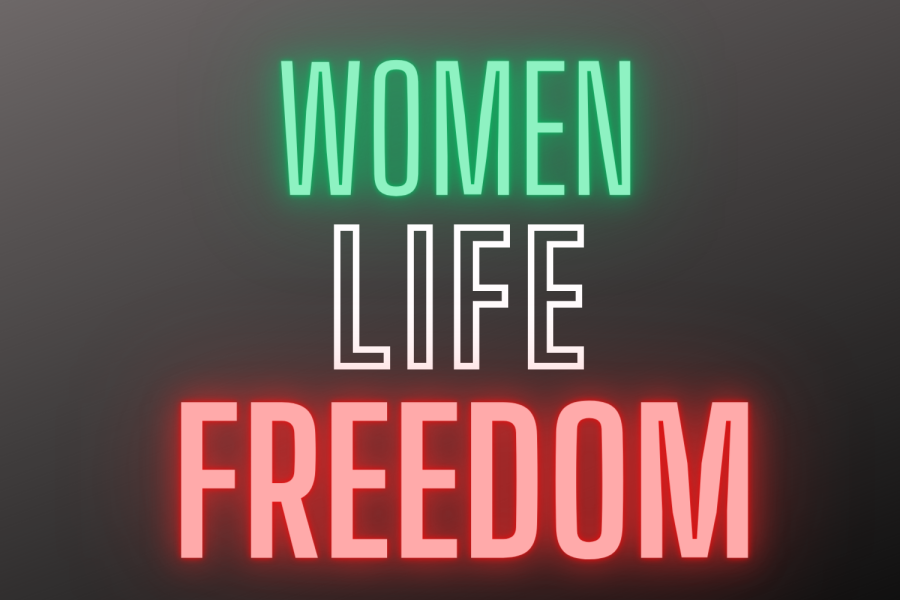A Call for Change
In the America of today, with increasing consciousness of feminism and a reinforced awareness of democracy, the fact that numerous other countries around us continue to oppose progress towards gender equality and secularism, and violently quash movements for reform, is an alarming realization that we face every day. Currently, one such crisis is happening in Iran as the country’s government is suppressing protests responding to an incident of police brutality.
“It makes me feel awful,” freshman Janan Moradmand said. “As a first-generation Iranian American I feel as if there isn’t much I can do for my family in Iran, for my mother country, and all the suffering.”
The situation has garnered attention from all around the world as many consider Iran as spearheading a cruel and crushing regime against human and women’s rights.
“It is unjust and cruel and these women deserve to have a choice on whether or not to wear their hijab,” sophomore Vaani Mathur said. “It is alarming that the police and government are not afraid of showing their immorality and cruelty.”
A broader movement to push for democracy and to respond to various other grievances has been ongoing in Iran, including the violent unrest in 2019 and 2020. The 2022 protests started when Iranian woman Mahsa Amini was detained by Iran’s “Morality Police,” a religious force, for her “improper” hijab. Hijabs and long, loose-fitting clothes for women have been mandatory in Iran since the revolution in 1979.
Eyewitnesses said Amini was beaten, tortured, and insulted by the police, though the police denied these claims. She eventually died due to the beating, according to medical scans. The clinic that treated Amini wrote a post on Instagram, that has since been deleted, that said that she was already brain-dead when she reached the clinic.
However, the Iranian government has not only denied the violence, but has also attributed Amini’s death to “heart problems.” Iran has responded to protests with violence and misinformation; for example, the killing of Iranian surgeon and protester Parisa Bahmani, who was reported to have been shot in the head by London-based news outlet Iran International, was attributed to a car crash by Iran’s medical council. According to Reuters on Nov. 22, the UN Office of the High Commissioner for Human Rights (OHCHR) said that more than 300 people had been killed so far in protesting Iran’s oppression, with more than 40 people being children.
The situation in Iran has also been cause for censorship; Iranian citizens have experienced several internet blocks and outages, and have been fearing a repeat of the 2019 internet shutdown. Further complicating the situation is the fact that digital darkness has made it difficult to come up with a comprehensive death toll record.
“The fact that people will still sometimes turn this situation around and say Iranians protesting are Islamophobic alarms me,” Moradmand said. “In reality, it is the religious trauma the Iranian people have been undergoing for over 40 years.”
Iranian oppression, however, has not stopped both Iranians and non-Iranians from pushing for reforms. Various human rights organizations including Human Rights Watch and Amnesty International have condemned Iran’s oppressive regime. The hashtag #MahsaAmini in both English and Persian has reportedly been retweeted on Twitter over 40 million times all around the world. Most importantly, Iranian brutality has not discouraged protests in the country.
The situation has alarmed many all over the world, but Iran’s regime still deserves attention from people both in Iran and in other countries. The more that people in other countries can support Iranians and raise awareness, the further all of us come towards achieving better conditions for people in autocratic countries. Meanwhile though, one can’t help but appreciate the perseverance that Iranians have shown in the face of the government’s brutality, as slogans such as “Women, Life, Freedom” will continue to give a voice to Iranian protesters.
Tejas is a senior in his third year on the Torch staff. He loves journalistic writing and is excited to run and showcase the Torch as co-editor-in-chief. Aspiring to pursue mechanical engineering in university, he’s also really passionate about Indian...


